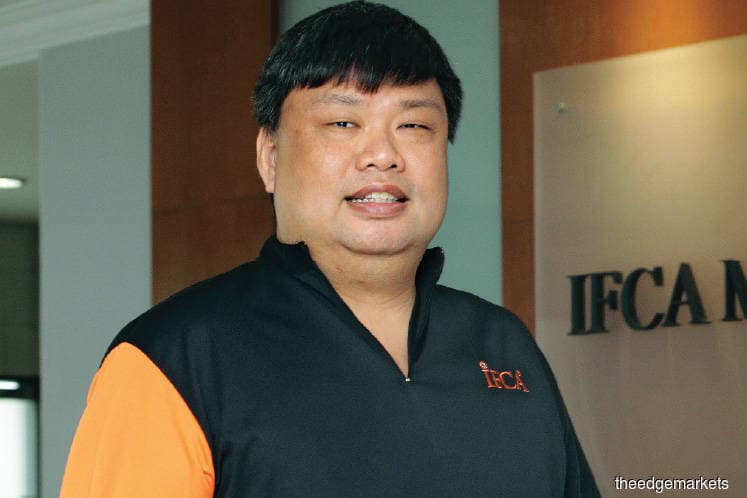
This article first appeared in The Edge Malaysia Weekly on November 20, 2017 - November 26, 2017
SOME two years ago, IFCA MSC Bhd was an investor favourite and widely seen as a prime beneficiary of the implementation of the Goods and Services Tax (GST).
Its share price hit an all-time high of RM1.77 on May 18, 2015, giving it a market capitalisation of RM1.012 billion and making it the world’s top-performing software company that year.
Back then, investors were expecting the ACE Market-listed company’s financial years ended Dec 31, 2014 (FY2014) and FY2015 to be bumper years as domestic property developers needed to upgrade their internal business and accounting systems and install GST software ahead of the new tax regime.
They did, and IFCA, an integrated business software and solution provider specialising in the property industry, did not disappoint investors. It delivered impressive earnings in both years, registering net profits of RM20.77 million and RM21.6 million in FY2014 and FY2015 respectively. In FY2013, it registered only RM1.72 million.
But when the GST excitement subsided and the property market slowed down, IFCA’s net profit plunged 98% year-on-year to merely RM518,000 in FY2016.
Despite gaining 47% year to date, its shares closed at 39 sen last Thursday, giving it a market capitalisation of RM237 million. In other words, more than 70% of IFCA’s market value has been wiped out from its 2015 peak.
In an interview with The Edge, IFCA CEO Michael Cho says he is under no pressure to return the share price to the highest point. Instead, his focus is on transforming the group’s businesses in the next two years.
“GST gave us a one-off lift in earnings. It was a good time. Many tech companies, including IFCA, enjoyed it. Being the new CEO, is there any pressure to bring the company to where it was? I don’t think so. Personally, I think our shareholders should expect more from us,” he says confidently.
Cho, who was appointed this year, has 22 years’ experience in Asia-Pacific, working in market segments ranging from international and multinational enterprises to local micro enterprises and small and medium enterprises.
Founded in 1987, IFCA has managed over 6,000 projects with total gross development value (GDV) exceeding RM100 billion. It has provided property management software solutions, customer relations management systems, human resource software solutions, property e-sales platforms, construction software solutions and hotel management software solutions, among others.
In 2015, IFCA launched Property365 — the first real-time transactional property e-marketplace in Malaysia.
Last month, IFCA embarked on a transformational programme known as IFCA 2.0 to strengthen its growth in the next few years. The company will focus on expanding its property technology offerings to help its customers accelerate their digital and mobile technology adoption to boost sales and business performance.
Cho believes proptech will redefine the property industry in the coming years. Thus, IFCA not only intends to catch the next big wave, it also intends to lead the way.
“IFCA has come a long way since its inception 30 years ago. Now, we want to create disruptive solutions to transform the property industry,” he says.
Asked if proptech will make IFCA shine again, Cho replies, “Proptech is sexy, for sure. But whether IFCA will become a sexy stock or not, it is up to the market to decide.”
He adds that IFCA is moving in the right direction. “If the market sees our foray into proptech bringing exponential growth, naturally, the investors will see good opportunity to invest in our company.”
“Eventually, our share price will go back to whatever it was before, or even higher. In fact, I wouldn’t put a limit on it and say our shares should be worth RM1.40 or RM1.50. Why can’t it be RM5 or RM10?” he asks.
Cho also stresses that IFCA has a clear view of where it wants to go. “Although there will be bumps along the road, we know the vehicle we are in and what we need to do to get to our destination.”
According to him, IFCA may consider transferring to the Main Board and even spin off and list its China operation on Nasdaq in the US.
However, he clarifies that these plans are not on IFCA’s priority list. “Obviously, we need to have a different track record if we want to transfer (to the Main Board). We will cross the bridge when we come to it. As we grow bigger, we hope to have a more diversified investor base. But at the moment, there is no immediate plan and specific timeframe,” he says.
IFCA has a talent pool of over 500 employees in its offices in Malaysia, China and Indonesia. Its research and development activities are carried out in Malaysia. China, which provides technology and industry domain expertise, is the central domain of all customised projects and undertakes marketing activities that cater for the China market.
“Listing on Nasdaq is also one of the plans, provided that we need to raise fresh capital. But it does not make a huge difference to us today, because we are already well-funded, and the company has a strong cash flow,” says Cho.
As at June 30, 2017, IFCA had cash of RM69.6 million and no borrowings.
Save by subscribing to us for your print and/or digital copy.
P/S: The Edge is also available on Apple's AppStore and Androids' Google Play.